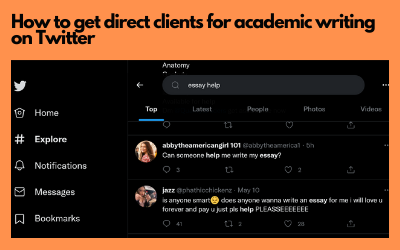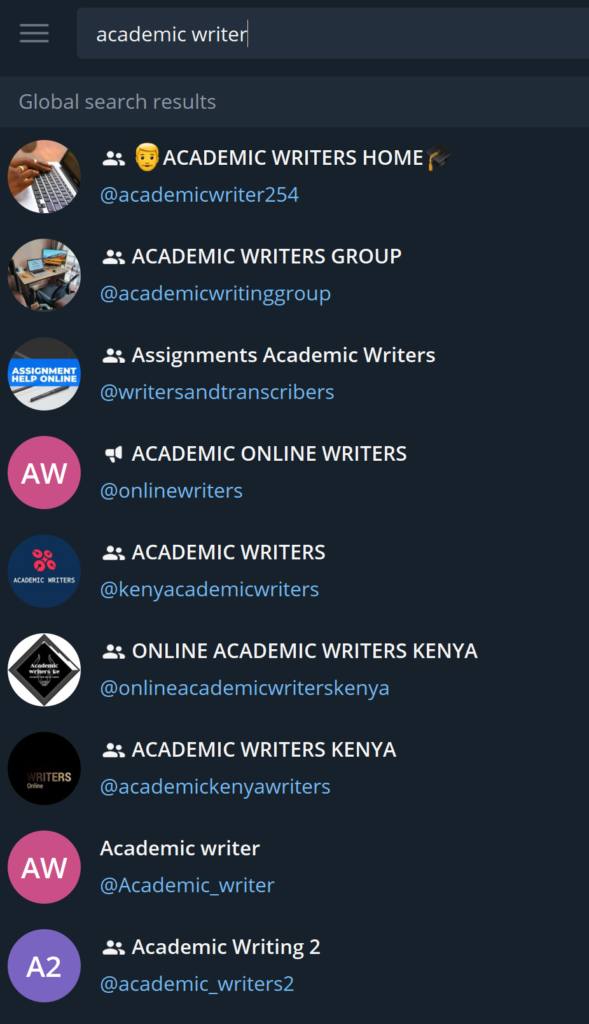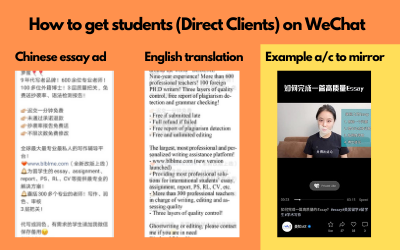Ghostwriting, in the form of academic writing, is a well-known source of income for quite a few Kenyan youths particularly due to biting unemployment.
Out of curiosity, I took up the task of finding out how academic writers find Direct Clients (DCs) given this is one of the most coveted secrets of their industry.
In summary, you can find DCs via Social Media (Instagram, Twitter, Reddit, WeChat, TikTok, Snapchat, Telegram, etc), Freelancing platforms (Fiverr, Upwork, Contra, etc), Question and Answer platforms like Quora, Personal Websites, Third Party Websites, and Friends and Family recommendations.
Key Takeaways
- DCs are a key way to obtain well-paying clients.
- The average income for ghostwriters in the academic field is Kshs 35,000 to Kshs. 400,000.
- Proven ways to get DCs include social media, freelancing platforms, Quora, websites, and networks of friends and relatives abroad.
- Social media sites are the easiest and cheapest ways to find DCs while third-party websites are the most expensive, costing over Kshs. 150,000.
Right off, I have to admit that this is among the most interesting online income opportunities I have written about. The only other hustles that come close are Getting Hourly Pay While Working Remotely for US firms and Freelancing on Fiverr. I have also covered some other unique approaches to making an income online.
Now, in ghostwriting, and also content writing in general, DCs are a key way to obtain well-paying tasks since no intermediaries are taking out a commission.
This is true given that someacademic writers in Kenya make up to Kshs. 400,000 per month.
This is according to Freelancing Income Averages from an empirical study by Pintar Africa Research and Consulting Ltd from 2021. (*Many other factors were found to affect how much money was made per month).
Worth noting though is that even with its “hidden” and “lucrative” nature, academic ghostwriting remains at an ethical crossroads. International media like the BBC and New York Times have highlighted it as a blatant issue of cheating amidst pushback from those engaged in the practice.
Now, ethical and moral issues aside, academic writing works just like any other industry.
There is a lot of demand for academic papers from international students and this attracts supply from willing writers (mostly in developing countries like Kenya).
The Freelancing Income Averages survey estimated Kenya to have between 150,000 to 250,000 active ghostwriters.
While a lot could be talked about the dynamics of getting such work, in this article I just focus on direct clients (DCs) and where to find them.
Also, I believe that finding direct clients is a primary concern not only for ghostwriters but general freelancers and digital nomads on platforms such as Fiverr and Upwork.
First, let’s define direct clients.
Who are Direct Clients in the context of academic writing?
In academic writing, the client is the learner who places an order for help with academic work.
Between the student and the actual writer/tutor are usually several types of intermediaries. These mainly include essay writing websites such as EssayPro, UvoCorp, EssayShark, UKEssays, and EduBirdie, among others. They get assignments/questions from students and find writers to do them. Other intermediaries include agents and question-based websites like CourseHero and Chegg.
The problem with working under these intermediaries is that a writer gets only a portion of what the student pays.
In addition, sometimes the processes of getting the work approved can be difficult factoring in quality standards stipulated by the intermediary (who are usually foreign) and the likelihood of manipulation and shifting goals on the nature of the work.
The solution is often to contact the students directly and work with them. These students are the Direct Clients or DCs as popularly known in the writing community.
While it seems straightforward, getting DCs is harder than it seems because while writers are based in Kenya, the DCs are often students in US, UK, and European universities.
A writer has to find the DC, contact them, and establish trust before the DC can hand over any writing assignment and pay for it.
The table below offers a quick summary of ways to find a DC while the other sections below discuss each approach in detail. The table will also answer the question of how much you may need to pay for a direct client for your academic writing gigs.
(You can also read this article on “How to Withdraw Money You Have Earned Online from PayPal Even After 180 days Limitation“)
Let’s start the discussion with how to find clients on social media.
How to find direct clients for academic writing using social media
Statistics show there are a total of 17 main social media platforms with a combined user base of 300 million people.
You can probably find clients on any of these social media sites but let’s focus on the main ones.
How do you get direct clients for academic writing on Twitter? Well, the answer is simple, search keywords like “essay”, “help”, “writing”, and other similar combinations, and respond to the people that come up in the results.
There is a high chance that most will not reply to you, but as soon as you get one client, you can easily rope in others via word of mouth.
To make sure your chances of getting a response are high, make your Twitter profile legitimate. A legitimate profile has a good username, a short profile, a real picture, followers, and regular tweets.

You can use the same strategy as Twitter for Reddit but just make sure you prioritize looking for communities on Reddit. There are a lot of Reddit communities around schools and subjects.
Once you find a community or a subject, you can post replies to people’s questions and ask them to contact you if they need further assistance.
Telegram
Telegram is like the downtown of academic writing.
While Twitter is a bit more refined and straightforward, Telegram is as confusing as a downtown public market. The reason is that Telegram is more about finding the right groups than individual clients.

With Telegram, some people start channels (often agents) and they add writers there.
You’ll find about 30-100 writers in one group and then the agent will send orders to the group and the writers can pick whichever orders they can do. In the process, it is possible to find contacts for a student.
How?
Well, crafty writers would keep asking for technical details of the order they are assigned and because the agent is handling so many orders, they add the writer and client to a separate group and monitor the interaction.
The writer can ask the client questions directly and of course, steal them from the agent by contacting them on the side.
To find the right academic writing telegram channels to join, you might need to start by joining legitimate academic writing Facebook groups.
Once in, search for telegram-related posts and then go from there. These groups are always evolving but once you are in a couple of them you will always know the next move.
A caution about Telegram is that just like downtown Nairobi, there are too many scammers.
People have paid as much as Kshs. 20,000 to be added to groups with constant orders only to find that the “agents” are just local conmen masquerading as genuine foreign agents.
The same strategy applied on Twitter works for Instagram.
However, an additional step for Instagram is following unofficial pages for target universities and trying to convert DCs from there. You’ll notice that there are thousands of universities spread across the US, UK, China, and Europe so you can never exhaust them.
So, the trick is to pick just a few – like 4 – and focus on them.
For each university, find pages that are not directly run by the school administration.
These are pages about sports and other co-curricular activities and they are often run by students themselves. Engage with the students in the comments and try to offer your services.
Avoid being too obvious and spammy – you’ll need a balance between being persuasive and being discreet.
You can also message the people you find in the comments directly with a short straightforward message on who you are and your services. (Probably link your Upwork or Fiverr profile to help build trust).
Also, if you have enough money, you can pay the admin of the page to do a Post or Instagram Story of your service with a link leading to your Instagram, Upwork, or Fiverr profile.
Snapchat and TikTok
These are a little tricky because they involve creating short videos and given their algorithms, it is hard to reach the right audience while operating from Kenya. If you are just starting in writing it would be recommended to avoid these.
However, if you are experienced and have money enough to set aside a marketing budget, then these platforms can be a goldmine. The simple strategy here is to go on Fiverr and find people willing to make videos for you. This is a trick used by other industries and not just academic writing.
You will find content creators – often young Caucasian women – who charge a fee to create a series of videos for a new TikTok or Snapchat account. For about Kshs. 20,000, you will get several videos that will create enough engagement and traction to earn you some clients.
The difficult part with this strategy is finding the right amount to spend, getting a content creator willing to do the videos on academic writing services, and understanding how to post the videos such that TikTok’s algorithm favors them.
The upside is that you’ll win the audience’s trust very easily (remember you are using a Caucasian content creator as a marketing agent).
WeChat academic writing agents are among the most recent avenues both to better-paying orders and direct clients.
If you have never heard of WeChat, first read this article on Easy Ways of Earning via WeChat in Kenya.
A key fact to note here is that a lot of academic writing clients are Chinese students in international universities. For instance, students from Beijing doing degrees in the UK or Australia.
As these students transition from China to their international universities, they find agents in these countries that connect them to writers who can help with their academic work.
These agents are often Chinese and they work directly with writers in groups – like the Telegram Channels that we mentioned above.
The agents and the students interact primarily on WeChat because it is among the most popular social media platforms in China. Agents will usually form WeChat groups, add international students in larger numbers, and advertise their services to the students.
Once they get the orders, the agents then post them on the Telegram Channels with their writers.
These are the channels that we mentioned where being added could cost as much as Kshs. 20,000 (also termed as ‘buying a WeChat agent’).
Once the agent posts the orders, writers pick and do them and they are then sent back to the clients. The agent gets a (big) cut of the payment in the process.

The strategy for getting a DC here is twofold.
The first approach is the one mentioned under the Telegram category above asking technical questions about the order instructions. The second approach is to try and find the clients yourself from WeChat.
You can get academic writing clients from WeChat by searching for keywords, messaging specific accounts, or creating your own groups.
The challenge is that WeChat clients mostly speak Chinese so it can be difficult to get your message across. A solution could be translating the posts and hoping the meaning is conveyed.
You may be lucky and find student groups affiliated with specific universities which means a high chance that the students understand English.
The simple strategy for finding students on WeChat is starting with pages, groups, and communities around a learning institution. Look for names of UK universities on WeChat and you may find unofficial pages run by students from China.
Such communities are more of support groups for international students. You can then identify specific accounts for individual students and message them about your services.
You could also enlist the help of Kenyan students studying in China but this is an unlikely course.
LinkedIn, Fiverr, and Upwork
LinkedIn is a professional network and a great platform for finding clients in general.
Believe it or not, people search for professional services on LinkedIn just as they do on Fiverr and Upwork.
On these platforms, start by creating a profile that stands out. Think like the person who is likely to hire you. What would they look for? What would make them trust you? What kind of work would they be looking for?
On LinkedIn, the goal is to showcase your experience and mostly target high-level clients who are doing master’s and doctorate degrees.
On Fiverr and Upwork, you will be competing with hundreds of other writers so creating a fully optimized profile is mandatory. Also, ensure you upload a portfolio and set competitive prices.
I have written more on Fiverr, specifically on Improving Gig Ranking on Fiverr and earning more.
Ultimately, the strategy for Fiverr and Upwork is to steal clients and move them outside the platform so that you can get paid more for the same amount of work.
Quora
Quora is a question-based platform meaning that all sorts of people post questions there and get answered by professionals (also anyone that has the best response).
To find DCs for academic writing there, simply search for questions posted around academic subjects, especially at the college level. Do not be random with the searchers, rather try to focus on a small niche.
For example, if you are good at statistics, find questions on that subject and answer them partially. Answering partially here means explaining enough to be rated as a good answer but leaving room for further breakdowns.
That way you can ask them to contact you if they need further details.
To increase your chances of converting a DC from Quora, it would be best to select common subjects that have frequently asked questions and that have had questions asked recently. Answering very old questions may not help you much so just filter questions by recency.
Also, your Quora profile should look professional and trustworthy. People will not trust a profile without a photo and any history of activity. So, that also means that you may need to answer several questions in a row on one specific area – like statistics.
This Quora strategy would work for any other platform where students post questions and get answers from Tutors or general experts in the area.
Personal academic writing website
There are two categories of websites that you can use to get academic writing DCs, personal websites, and third-party websites.
Third-party academic writing websites
We have already mentioned some third-party (intermediary) websites above including UvoCorp, EssayShark, EssayPro, etc. There are hundreds of these websites.
The strategy for getting a DC here is to steal them from the website. This is often a risky affair for two reasons.
First, getting an account itself is a costly affair as you might need to buy it from someone at costs ranging from Kshs. 15,000 to Kshs. 150,000 or more for decent accounts.
Second, account admins monitor the exchange of personal information between the writer and the client and will ban you from such activity. They use bots to check for email or phone numbers in the messages and submitted orders so it is very hard to trick them.
However, you can still steal a client through clever tactics such as spelling out a phone number or spacing out an email address. Some people also just sacrifice the account – if it was relatively cheap – if they are sure they will move a good (recurrent) client outside the platform.
Personal writing websites
The other category of websites is the personal service website. These are similar to the other intermediaries only that you will be the owner. Here, you pay a web developer to create for you a website advertising your services and then you try and use different marketing strategies to get direct clients to see it.
This strategy is better for writers who have been in the industry for long enough because it needs patience and money. The reason is that it relies on Google search results to convert the clients. And before a website can show up on Google’s first page for anything, it must meet certain criteria including being at least 6 months old.
The secret to great websites is focusing on a single area – or even a subject – and using SEO strategies to rank for specific terms that the direct clients could be searching for. Do not try and rank for terms like ‘essay help’ or ‘assignment help’ because they have too much competition.
Rather, you can narrow it down to unexplored areas such as a specific topic in statistics or a specific literature book or story. Use the blog section of your website to create content that can rank and link back to your homepage where you advertise your service.
If working with a big budget, you can pay for Google’s AdWords to promote specific pieces of content that you believe are in high demand.
Personal websites are a long-term strategy so you need to use them if you have the patience and money.
Using your friends and relatives in universities abroad (UK, US, and Europe)
You can enlist the help of your friends or relatives abroad to advertise your academic writing services to possible clients in their vicinity.
This is among the easiest strategies because trust can be established faster in person than through the internet. In particular, when you directly know someone studying in a foreign university and they are short on cash you could easily enlist their help to market your services.
Such a strategy would be close to what intermediary writing companies do; they hire student “ambassadors” that send traffic back to the websites where orders can be made. It is also common nowadays to encounter Chinese individuals living in the US, UK, and Europe acting as agents because they are already in contact with the Chinese student communities in those countries.
Academic freelance writing clients for Kenyan (African) writers
It is worth mentioning that Kenyans have built a name for themselves internationally when it comes to ghostwriting.
As stated at the beginning, the practice has even been covered by international media houses. The same stories are present of Chinese students seeking ghostwriting services from Africa. This implies that it is not too hard to make money doing academic writing.
There are thousands of students looking for essays, reports, dissertations, reviews, and all sorts of academic assignments help. That’s why firms such as Course Hero and Chegg are thriving.
The problem is however that there is often a general distrust towards Africa-based online freelancers, especially from foreigners that do not fully understand the extent of skills available in Africa.
Also, the last few years of a boom in freelancing globally have harbored allegations of financial fraud across different countries particularly in Nigeria targeted at customers in first-world countries. Such allegations worsen the situation for all freelancers because earning clients’ trust becomes even harder.
Therefore, it is important to build a legitimate profile to help obtain long-term clients and a good reputation.

















